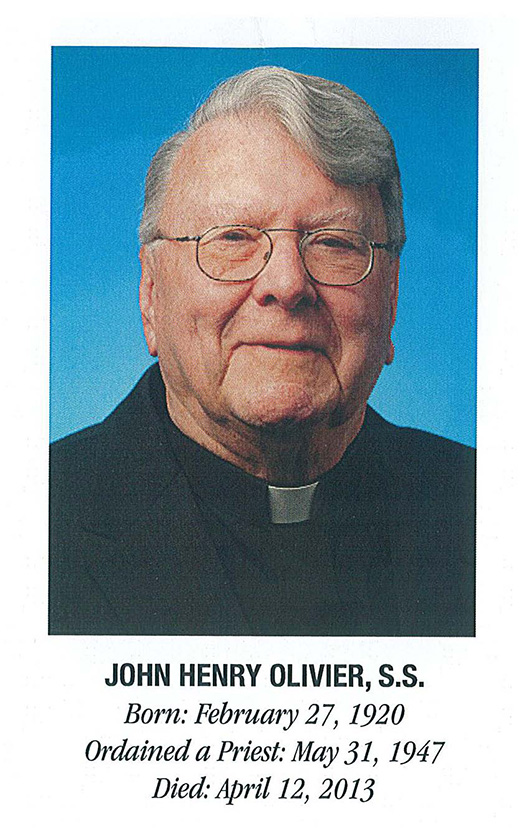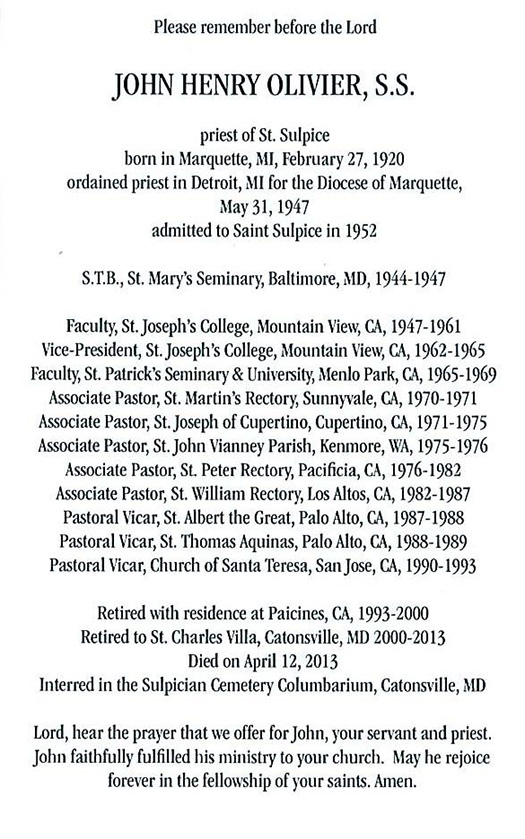Olivier, Father John Henry, S.S.
2013, April 12
Date of Birth: 1920, February
“Sing to the Lord a new song . . .” are the words of the psalm 96 that could very well be the continuing prayer of Fr. Olivier, whose own music will give God praise for generations. For nearly sixty-six years as a priest, Fr. Olivier filled the voices of the faithful with original settings for antiphons and hymns of praise. His music for the Chrism Mass, written for the Diocese of San Jose, and his setting of the prayer of Fr. Jean-Jacques Olier, among other compositions, continue to be sung to this day. This Titanic musical talent is now enjoying the harmonies of the heavenly choir.
Fr. Olivier was born on February 27, 1920. He was the second of seven children born to George and Gertrude Olivier. He is survived by two brothers, Stephen and Paul, and two sisters, Frances Trainor and Mary Puetzer and nieces and nephews.
Fr. Olivier attended St. Charles College in Catonsville, MD from 1936 – 1940. His philosophy studies were at St. Mary’s Seminary on Paca Street in Baltimore from 1940 - 1942. His theological studies were at St. Mary’s Seminary in Roland Park, Baltimore, MD where he earned his S.T.B. Fr. Olivier was ordained to the priesthood on May 31, 1947 for the Diocese of Marquette, MI and was admitted to the Society of St. Sulpice in 1952.
He spent his Sulpician ministry on the West coast, splitting his service between seminary education (twenty-two years) and parochial ministry (twenty-four years). He was on the faculty at St. Joseph’s College, Mountain View, CA from 1947 - 1965 and served as Vice-President of the College for his last three years there (1962 - 1965). Fr. Olivier moved to the theologate at St. Patrick’s Seminary in Menlo Park, CA from 1965 - 1969.
He spent the greatest part of his parochial ministry in the Diocese of San Jose, CA where he served in various parishes from 1969 - 1993. For one year (1975 - 1976), he served on the parish team of St. John Vianney, which was established in conjunction with St. Thomas Seminary, Kenmore, WA.
Fr. Olivier retired in 1993 to live in a one-bedroom, hundred-year-old farmhouse at the Pinnacles Ranch of his great friends, Peggy and Stuart Kingman, in Paicines, CA. In 2000 he moved from this “hermitage,” as he called it, to the Sulpician retirement community at St. Charles Villa in Catonsville where he lived until his death in 2013. Peggy recalled the words of a popular song, “Almost Home,” that she shared with him the last time they visited only a few years before he died. They seem appropriate now, too:
“I’m not running,
I’m not hiding,
I’m just falling into the arms of the Great Wide Open.
Gonna pull my soul in
And I’m almost Home.”
During his years in seminary education, Fr. Olivier taught music, speech, Latin, English and French, but is especially well-remembered for his chant classes. Whether he was teaching high school, college, or theology seminarians, the last question in every exam was the same: What is the best class of the week? The answer, of course, was “chant.” This reply came easily to every student, for Fr. Olivier was loved dearly not only for his enthusiastic and engaging pedagogy but also for his character as a true gentleman of St. Sulpice.
Fr. Olivier taught beyond the walls of the classroom as well. His teaching by example was most evident in the way he celebrated the Eucharist. He never “said Mass.” He always “celebrated” the Eucharist with a reverence that was palpable in prayerful solemnity and exquisite vestments.
A man who knew and appreciated all types of music, Fr. Olivier also taught through the “concert” series he introduced after Vespers during the winter months at St. Joseph’s College. There he would explain everything from classical music to Broadway scores. To this day his students cannot hear Bach, Gregorian Chant, or “Oklahoma” without remembering his attempts to get all in tune and in appreciation of heavenly harmonies.
Whether in the seminary, or later in his parochial ministry, he enlivened the liturgy by his unique ability to create a singing community. He formed a profound friendship with the famous liturgical musician, Sr. Suzanne Toolan, R.S.M. With her collaboration, the Masses at the Mercy Motherhouse in Burlingame, CA became famous for their prayerful celebration and the vibrant sung participation of the community.
Actually, Fr. Olivier seemed to sing more than he talked. His humor overflowed into song. He had that uncanny ability to create lyrics, or to draw upon well-known ones, to capture the moment, to lighten the mood, or to pinpoint someone’s unique characteristic. His students, for example, remember his fanciful renditions of “I’m an Oscar Myer Wiener.” And while his keyboard virtuosity had its lighter side, it was also respected by those serious about music. Fr. Olivier was one of only a handful of musicians ever invited to play the organ at Memorial Church on the campus of Stanford University.
His ecumenical openness extended beyond music. He was frequently invited to preach at the Presbyterian churches of Palo Alto and Menlo Park. Through this ministry he became a good friend of the renowned Protestant ecumenist Robert McAfee Brown.
Even in the hospital, as he was recovering from the pneumonia that was the precursor of his imminent death, he would entertain each nurse with a clever turn of phrase or sing a line from a tune that caught the moment, especially the embarrassing ones. It would cause them to stop their work and break into a smile. When his memory began to fail, as his eyesight already had, he couldn’t always recognize the nurse or recall her name to acknowledge who was caring for him. So he would simply greet her singing “Let me call you sweetheart,” then continue with a conversation that converted clinical treatments into the caring warmth of a personal relationship.
His sense of humor and joy were legendary. He so loved what he was doing. He seemed to be always rejoicing. Over his desk in his suite at the Villa hung a banner with a quote from Teilhard de Chardin which reads, “Joy is the most infallible sign of the presence of God.” That verse could well be the caption that captures the conviction that governed his life.
As our lives have a consistency about them, those who knew Fr. Olivier in his parish ministry experienced that same gentlemanly character. The manner of this man reflected the compassion and the hospitable inclusiveness of Christ. One former parishioner spoke for many when she said, “The Church has never been more welcoming than when John was at the helm. You could feel his welcoming love from the pulpit. His deep melodic voice would make you smile.”
Whether in the seminary or in the parish, Fr. Olivier developed lasting relationships. Relationships, in fact, were his way of seeing the face of God. For Fr. Olivier, life was all about relationships. The life he led was defined by the hands he held in his heart. What is left when everything starts to go – the positions, the role, the impact, the eyesight, the knees, the memory? The psalmist in all of us wants to weep: “Out of the depths I cry to you, O God.” But that was not Fr. Olivier’s way. What was left for him were all the relationships he built up and around all those things that were starting to go.
When he finally retired in the East at St. Charles Villa, he held in his heart the hands of those with whom he had forged relationships in the West. His spirituality was rooted in and nourished by those relationships. His supportive network, refusing to unravel over time and distance, sustained him. As his physical sight declined, his spiritual eyesight increased. He found more strength in the spirit than in the flesh. While physical diminishment comes with the territory of aging, Fr. Olivier showed us that we are more than our bodies. He aged with grace.
He allowed his inner spirit to direct what he saw and who he was so that, in those final years of retirement, he became an icon of aging for the next generation. The attitude he took to living with his disabilities made all the difference. His positive disposition, his humor, his love of community (especially in its gathering for Happy Hour) sustained him. So did his indomitable interest in music and in reading. He could not see well, but he could hear. He listened to music and he listened to books on tape and to books read to him by his readers who visited him faithfully. These exercises kept his mind alive, his conversations fresh, and his relationships intact.
Those who knew Fr. Olivier well knew that he was no stranger to darkness and depression. Even though he lived with his favorite depiction of God “throwing our sins behind his back,” and while he helped many see their own goodness as God does, he battled the demon of self-doubt and suffered insecurity because he was unable to grasp just how much people truly loved him. Everyone around him knew he was better than he gave himself credit for being. And, from time to time, he knew it too.
As his breath grew shallow and his final days drew near, he intuitively knew his death was not long in coming. He asked to go home. Fr. Olivier did not want to die in the foreign land of the rehab center surrounded by strangers. He wanted to go home to join his community for Happy Hour once again, and then to die surrounded by the community he loved. And so it was.
One of Fr. Olivier’s favorite poems was “A Psalm of E=MC2 Easter” by Edward Hays. Its final stanzas capture Fr. Olivier’s spirit and spirituality:
In your infinite design
nothing dies;
it only changes form,
until it finally and forever changes
into your form,
into the energy of the light of love divine.
Take hope, my heart,
be firm my feeble faith,
for the matter of the flesh and bone I call me
will also become an Einstein Easter Event.
Fr. Olivier died peacefully during the night of April 12, 2013, with music playing in the background. In a final gesture of selflessness, he had arranged to make his body an anatomical gift to medicine. Thus, there was no viewing, no wake, no funeral. A Memorial Mass was celebrated at St. Martin’s Home for the Aged of the Little Sisters of the Poor on April 20, 2012. Fr. Thomas Ulshafer, S.S., Provincial, Society of St. Sulpice, Province of the United States, presided and Fr. Cale Crowley, S.S., Director of St. Charles Villa, preached the homily. Much later, Fr. Olivier’s ashes were interred in the columbarium at the Sulpician cemetery in Catonsville, MD.
To say that Fr. Olivier stands tall in the memory of those he met does not begin to capture the deep impact he has made on his friends from the parish, his confreres in the Society, and all those who were enlivened by his music and enriched by his liturgies and his homilies. His favorite musical arrangement, sung as the communion meditation at his Memorial Mass, testifies to all:
O sacrum convivium!
in quo Christus sumitur:
recolitur memoria passionis ejus;
mens impletur gratia:
et futurae gloriae nobis pignus datur.
Alleluia, alleluia, alleluia.
Richard M. Gula, S.S.
Director of Personnel


